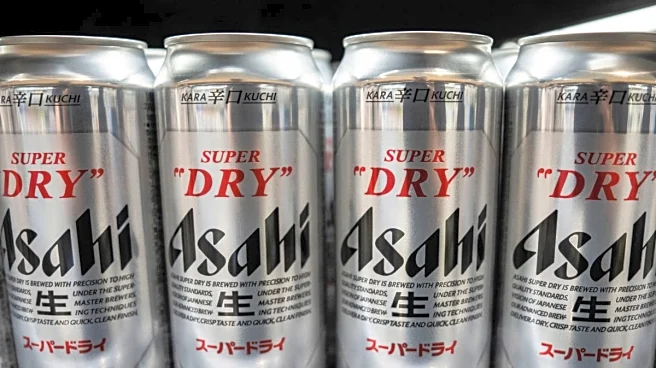Japan’s beer lovers may soon find their favourite drink, Asahi Super Dry, missing from shelves, as the country’s largest brewer, Asahi Group Holdings, suffers a major cyberattack. The system outage has
brought domestic breweries to a standstill, while delivery and shipment operations have also been halted.
With no immediate recovery in sight, pubs, restaurants, supermarkets, and convenience stores are bracing for shortages of Japan’s best-selling beer and other Asahi beverages.
This crisis not only threatens barstools and store coolers but also highlights the growing vulnerability of global supply chains to digital sabotage.
Cyber Attack Halts Production
The Asahi Group on Monday announced that it had suffered a cyberattack, which triggered a “system failure” across its Japan-based operations.
This disruption halted orders, deliveries, and customer service functions. The company stated, “We are actively investigating the cause and working to restore operations; however, there is currently no estimated timeline for recovery.”
Most of the company’s 30 domestic plants have been unable to operate since September 29, according to company disclosures. While the brewer has attempted to identify the scope of the damage, it remains unclear how many facilities have been directly affected, as reported by Reuters.
At present, the issue is limited to Japan, with Asahi stressing that international businesses, particularly in Europe, remain unaffected.
The company also suspended its call centre operations but confirmed there had been no “confirmed leakage of personal information or customer data.” It acknowledged the seriousness of the attack and apologised to customers and partners.
A Beer With Heritage
Founded in 1889, Asahi began as a local brewery before becoming a global drinks giant. Its iconic Asahi Super Dry, introduced in the late 20th century, is now Japan’s best-selling beer and a staple at pubs, supermarkets, and restaurants.
Beyond beer, Asahi also produces non-alcoholic drinks, whisky under brands like Nikka, baby food, and private-label products for major retailers.
Asahi Group is Japan’s market leader and one of the world’s largest beverage companies. Based on 2024 figures, it produces about 6.7 million large bottles of beer daily in Japan. Nearly half of its overall sales revenue comes from its domestic operations. In the first half of 2025 alone, Asahi reported sales of approximately 1,360 billion yen (about $9.24 billion USD).
But Japan’s shrinking alcohol consumption, especially among younger generations, has pressured the domestic market. To counter this, CEO Atsushi Katsuki announced plans in 2024 to double sales of low- and no-alcohol beverages to 20 per cent of the company’s total.
The cyberattack is already weighing on finances. Shares fell 2.6 per cent on Thursday after news broke. Eight new product launches, including fruit sodas, ginger ale, and protein bars, have also been postponed indefinitely.
On Wednesday, Asahi tested paper-based manual systems to process orders and deliveries, though it is unclear whether such methods can be scaled to meet nationwide demand.
Meanwhile, the group’s international operations—including European brands like Peroni Nastro Azzurro, Grolsch, Pilsner Urquell, and Fuller’s in the UK—continue unaffected.
Retailers Race Against Empty Shelves
According to a report by the Financial Times, supermarkets, convenience stores, and izakaya pubs are preparing for shelves to empty. While some demand may shift to rival brands like Kirin and Suntory, experts note that loyalty to Asahi Super Dry’s crisp taste will make switching difficult for many drinkers.
FamilyMart, one of Japan’s largest convenience store chains, announced on Thursday that its Famimaru line of bottled teas produced by Asahi is likely to face shortages or go out of stock.
“We sincerely apologise to our customers for any inconvenience caused,” the company said, adding that it is working with Asahi to resume sales as soon as possible.
With production at a standstill, the Japanese-owned global convenience store chain, 7-Eleven, has also suspended shipments of Asahi products throughout the country, affecting the availability of the popular beverages for consumers.
Cyber Threats On The Rise In Japan
The incident underscores a growing vulnerability in Japan’s corporate sector. Cybersecurity firm Nihon Cyber Defence (NCD) has long warned that Japanese companies are prime targets due to weak defences and discreet ransom settlements.
The National Police Agency recorded 222 ransomware attacks in 2024, up 12 per cent from the previous year, though experts believe the true number is far higher. Almost half of the affected firms took at least a month to recover lost data.
Recognising the risks, Japan passed new legislation in May to strengthen its fight against cybercrime. “Without an urgent upgrade of the nation’s cyber security, the lives of Japanese people will be put at risk,” warned Itsunori Onodera, chair of the government’s policy research council.
Why This Attack Stings More
In its 2024 annual report, Asahi itself had flagged cyberattacks as a key risk to business continuity and brand reputation. The latest crisis has made those warnings real.
Restaurants and retailers are scrambling to adapt supply chains, while drinkers face dwindling access to their favourite beer. Even if systems are restored soon, the damage to seasonal sales and brand image may linger.
For now, Asahi is trying to keep things moving with paper-based workarounds—but for a company producing millions of bottles a day, going analogue is unlikely to be more than a temporary fix.








/images/ppid_a911dc6a-image-177092774715746114.webp)

/images/ppid_a911dc6a-image-177092767520012684.webp)
/images/ppid_a911dc6a-image-177092763347449403.webp)
/images/ppid_a911dc6a-image-177092652580356823.webp)

